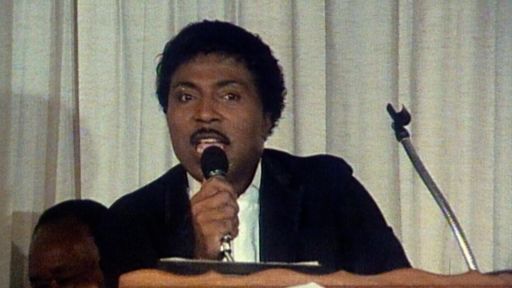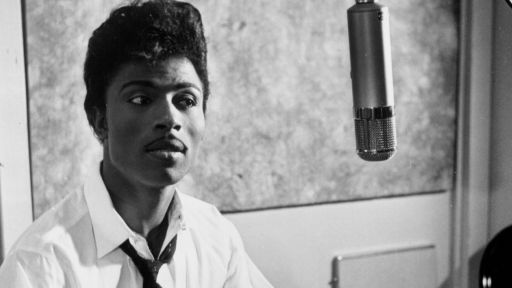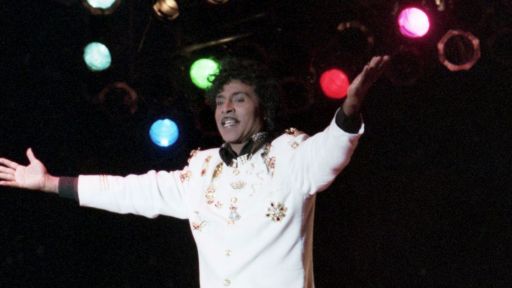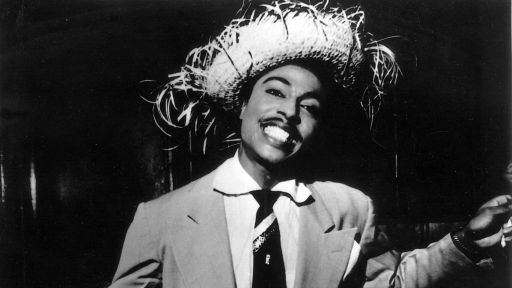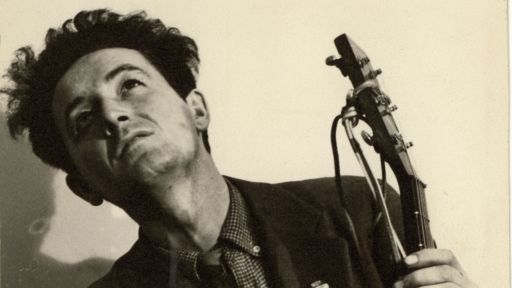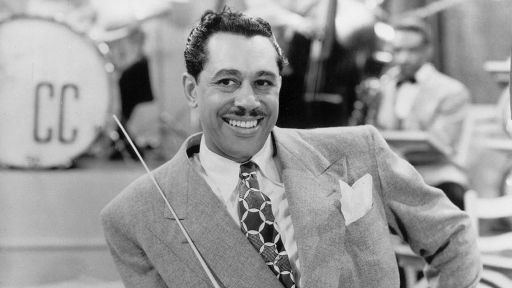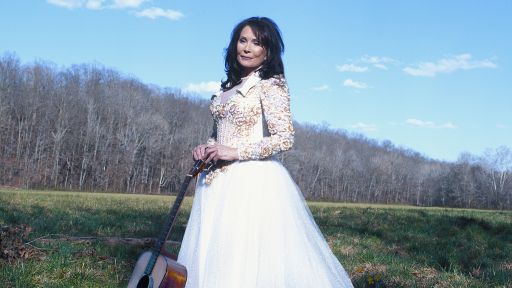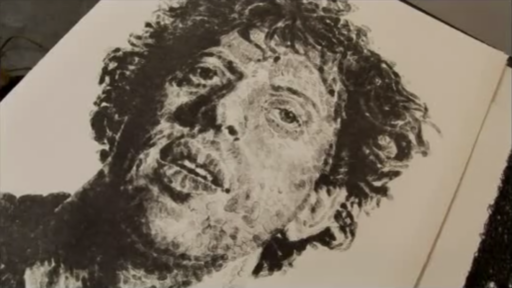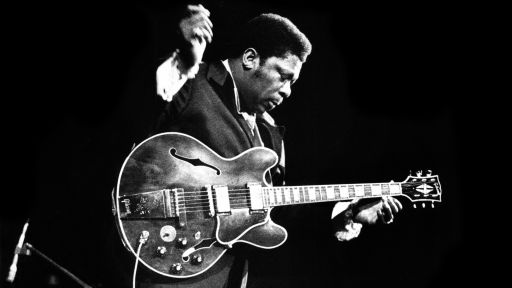TRANSCRIPT
It was around the late '80s going into the '90s when I discovered Little Richard, and it definitely was from seeing him on TV.
He seemed like he was someone that I could connect with because it seemed like me and him had some similarities, especially with gospel music.
Being a queer kid from New Orleans and loving gospel music and growing up in gospel music, I definitely felt the connection.
That was the connection that me and him had for sure.
I did gospel music since I was a little bitty, teeny baby, and so those similarities were definitely strong when it came to the gospel music.
And in gospel music, especially in the Black churches, you know, we have a lot of queer artists, being if it's the musician on the piano or the organist or the choir director or in a choir, a lot of us or our churches, they opened their doors and showed love to us.
I know I had that love and acceptance at my church home.
I had a church mother who, she connected with me immediately when I joined the church, and kind of took me under her wing.
And I'm assuming Richard had the same thing.
Someone that took him under their wing and allowed him to be himself in church, but also allowed him to musically, do what he loved to do, which was sing.
And my godmother, who was the choir director, she always wanted to put me in front of the church and do a solo and do speeches, and talk about just being able to have that moment of a safety net.
I'm assuming we had those connections together.
Those connections of being able to be ourselves, also love the music that we love to do, and just let it be shown in gospel music.
I mean, church was that way of bringing all of us together and having that connection with the people in the neighborhood, the people who visit the church, that was that moment where we could rejoice and be happy and sing wonderful gospel songs.
Yeah, it is definitely inspiring to see all of that around you.
You just in church as a kid, not knowing what's going to happen with your life.
You're just in the moment where we're there to enjoy the music.
And that's what it was about, enjoying the music, enjoying the scenery, connecting with the word of God.
Yeah, I mean, I was a queer kid, so that was something that they could not deny.
They knew that I was this big queen in church, and my church family, they put their arms around me and they started to show me love and they accepted me, and that's what I'm feeling that Richard also went through.
That he was accepted in church, and he was the one that they put the spotlight on in church.
Especially with him being able to sing and play music, I'm certain that he was the one that they would call all the time to do something in church, just as well as me.
When we were young as gay kids and we step onto the gay scene, there is this community of people that's just like you.
And that gives you a moment to like just lay your hair down and be yourself.
You can talk the way you want to talk, you could walk the way you want to walk, you could act the way you want to walk.
I mean, walk the way you want to walk.
When I was growing up, we had Club Wolfendales and Club Fusions, and those were the moments where I stepped on the scene and people started to show me love.
It was people who was just like me, who put their arms around me and kinda showed me the ropes.
And I can remember being small, that some of the queers, would ask me what's my name, and "Where you from?"
And then they would become kinda like a role model, in a sense, to you.
And kinda put you under their wing per se, or ask you what you like to do.
Kinda trying to show you the ropes and kinda guide you on, where they think you will fit in or where you may not fit in.
You always have a community of people that shows you different things in the gay world, and for me it was just all exposure to people that was just like me.
It was that moment where I had all of these different queers that I kind of knew from hearing their name in the neighborhood, but then I had a opportunity to meet them and get with them and vibe with them at the club.
We're definitely finding people that's just like us.
We're getting that community of people all together.
We're all in this big old room and we're learning how to connect with each other and create these moments.
Oh, yeah, we definitely had the gay scenes where we would do the drag shows, and you would have an emcee who will host the night.
You would have all these different girls that's local and from afar who will come and do a couple of numbers.
You have everybody in the audience hollering and screaming for 'em.
You have people throwing money on stage.
We had those different moments where the drag nights were just fabulous.
People coming in their big old ball gowns, and you have them doing different categories.
We also would have the gay pageants where they would do sportswear and swimwear, and question and answers, the evening gown section.
So as growing up as a kid, I was able to go see some of these balls and be on the gay scene, and it was just fabulous.
You would have people that would be the emcee that would also tell jokes in the middle of the intermissions, or would, per se, say "read" the girls while they were on stage, or if they didn't do something right, you will have that host that will call them out.
So there was a lot of moments that we had the same similar things that happened to Little Richard back then in the shows that he went to.
We still have those balls today.
I think every place around the world who has a gay scene has these different balls and things, but it is definitely a thing that New Orleans has been doing for a very long time.
Back then when I was a young queen, they had the girls doing the drag shows.
I used to run a lot of 'em.
I used to be the host of quite a few drag shows that we did in my circle.
We used to call it "commercial break," where in between each, we put a twist on it from all the girls that we knew were doing it before we grew up and started stepping onto the bounce scene, we put a twist on it where in between each performer of a drag performer, we would say, "commercial break!"
And then the beat would come on and everybody in the whole club would just bend over and start shaking.
So we created our own moments in the drag scene.
We got the whole setup from all the older queens who came before us.
All we did as the new generation is took it and put a twist on it.
That's definitely a big part of the history here in New Orleans.
You had people like Lady Denise, Miss Gina, all the different queens that came before us who really set the tone.
Sissy Shannon, who set the tone for the whole gay community and kinda paved the way for us.
Bobby Marchan.
You had a lot of different people that came before us and really set the tone and made it possible for us to even be here today.
I definitely think that music is something that brings us all together.
Music brings all people together, all walks of life, all backgrounds.
I think music is one thing that we all can connect to, and Little Richard was a big influence on a lot of us, and especially in the gay world.
Once he started really finding himself and putting his music out there in the world, he helped connect a lot of us and bring us together.
That was one of my favorites.
"Tutti Frutti."
Oh, yes, that was one of my favorites up there.
I mean, I love it.
I mean, just the energy behind the song, the lyrics.
I mean, when I first heard it, I was like, this is me all day.
I feel like he was definitely directing the song towards the whole gay community and I connected with it right away.
Oh, really?
Oh my God.
I love it.
I never knew that, but I love it.
Yeah, I mean, just the word tutti frutti.
It connects you to the gay community.
We are tutti fruttis.
Everybody want to call us fruits and sweet, and anything that dealing with any of that you feel like is directed to the gay community, for certain.
Yeah, I think that the queer folks definitely were able to spot it and call it out.
And I'm certain that he told his gay friends the meaning of the song and what these words are.
This is something directly for us.
I think it took a lot of courage for Richard to have to perform with the way that he wanted to perform.
His style of clothing, his style of hair, especially with it not being so accepted back then, and they were still fighting to be themselves, for their rights.
A lot of times, even when I was growing up, everything was so hush hush on the gay scene or just in the straight community.
You have to be kinda quiet about a lot of things on the gay scene.
We only had our own little small world.
So I'm certain that it was hard for him to be accepted by his community, by his parents, by everybody around him, except the people who were just like him.
Yeah, I think he definitely put himself out there for a lot of people who didn't have the voice or the strength to do and be themselves.
So he definitely opened many doors for gay kids who were just quiet and sheltered in.
He also put it out there for the world to see.
Yeah, back then, there wasn't many people doing that.
There were very few that were able to be bold and to be queer, and to be able to be out there and be themselves.
I think all the artists owe him.
Just all the artists that came after him.
He was a big influence on the culture and on the music scene.
I think they all have to pay homage to the great.
He was one of the greats.
I think he's definitely been a big influence on me just being able to be himself, being out there and going show the world who he is, his music impact in the music industry.
Just his flamboyant spirit and love for clothes and makeup and hair.
I definitely think he has a big influence on me and everybody like me.
Oh, most definitely.
You see everybody has a little of that swag of Little Richard in them, from the funky outfits to the suits with a different kind of bow ties and the kind of the "I'm God" of the look, up-do hairstyles, all of that.
All of that was way back in the '50s when Little Richard was out.
And so you can see that in everybody, from artists like myself, Janelle Monae, Lizzo.
You could see it in everybody in today's culture has a little piece of Little Richard and they may not even know it.
I am very thankful for Little Richard and all the other queers who came before me that makes it possible for us to even be here today, and be able to endure some of the things that he endured and growing up before homosexuality was even, a thing.
I'm forever grateful for all of those who came before me.
And I'm still paving the way for some that will come after me.
That is definitely what it's like to blaze a trail.
It's never easy.
It's always a struggle, and that's what makes us who we are.
That's what made him so powerful.
That's what made him such a iconic figure in the music industry.



